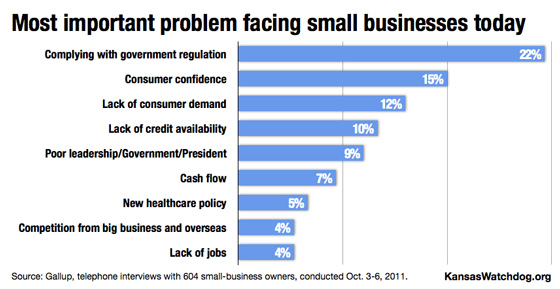|

Regulations Harm Small Business and Protects Corporations
The
prospects for conducting commerce are never an easy task. The hurdles to start a business much less stay competitive demands
the greatest skill and fortitude. Innovation and inspiration often is the best course for those bold enough to become an employer.
The idea that a level playing field exists for all comers is preposterous. The entire macrocosm for business rests upon separating
your enterprise from that of your rivalries. Such is a basic lesson for those brave or foolish enough to enter the arena.
"Businesses with 20 employees or fewer pay 36 percent more than their larger
counterparts (defined as those with 500 or more employees), says the report – called "The Impact of Regulatory Costs on Small Firms"
-- from the SBA's Office of Advocacy. This is because a lot of costs are fixed -- the same whether you have two employees
or 2,000. Total annual cost of following the rules for a small business: $10,585 per employee, or about $2,830 more than big
business. Businesses with 20 to 499 employees paid about $7,454 per employee, or about $300 less than the largest companies. The report estimates that
89 percent of all firms in the U.S. employ fewer than 20 workers. By comparison, large firms account for only 0.3 percent
of all U.S. firms. Says the report: "If federal regulations place
a differentially large cost on small business, this potentially causes inefficiencies in the structure of American enterprises,
and the relocation of production facilities to less regulated countries, and adversely affects the international competitiveness
of domestically produced American products and services."
The
screams for jobs, jobs and jobs would give the hint that federal, state and local business policy would favor the productive
engine of employment. However, in the real world of political influence and favoritism only the well connected get the advantages. Government regulations are meant to stifle competition. The legislative process
graces those who are well connected, financially heeled and schooled in the art of writing the regulations. Few small businesses
have a legal department or experienced lobbyists. In Big
Business and Big Government, Timothy P. Carney writes, "As the federal government has progressively become larger over the decades,
every significant introduction of government regulation, taxation, and spending has been to the benefit of some big business."
Mr. Carney presents compelling evidence on the history of this axiom, in his article.
The net result from this covert partnership of interest and rewards is the never ending campaign contribution cycle that finances
every election. The small businessman seldom has the resources or crony relationships to wage off the grand strategies of
the giant corporate model. Their advantage stems not from mastering
sound and creative business practices. On the contrary, the major corporations use their brute force to buy or stamp out any
contender that dares compete for market share. Access to capital
or the lack thereof, dooms most small businesses. The burden of regulations only compounds the severity of the survival rate
and burns up reserved funds which often cannot be replenished. How can small business compete? – offers this insight. "Small business can’t control mass-market designs or brands, but we are well-placed to do what big business
can’t: Get inside the hearts and minds of our customers."
As true as that advice resonates, the regulation landmines prevent small businesses from operating on a scale that
can challenge all the advantages of the state sponsored conglomerates. The hard truth is that free enterprise is dead and
in its place is an administered economy designed to suppress individually owned and managed businesses. The prospects of reestablishing a political atmosphere that favors small business
as the primary mechanism of job creation is remote as long as the transnational global and corporatist culture exists. Bigger
is not better in most cases. Bigger usually means there are fewer companies in the same industry, accompanied with shrinkage
in good paying jobs. Theodore F. di Stefano suggests four steps that small businesses need to focus upon, 1.
Creating a Niche A niche is a special quality
or group of qualities that sets the small business apart from its larger competitors. It has also been described as a small,
specialized business market.
2. Employee
Training If a small business is going to
act as though the customer is truly special, its employees must be trained accordingly. Also, they must work for managers
whom they respect and who respect them. They must not be put on the "floor" to meet customers until they are thoroughly
familiar with their product, be it food, auto services or any other product.
3. Management Philosophy The
owners of a small business must know the goals (mission) of their business and how they intend to achieve these goals. They
should be clear about what segment of the market is their target and how they intend to appeal to that segment.
4. Good In-House Financial Management You must be particularly aware of your current and projected cash position. And,
you should certainly create a realistic annual budget for your company that serves as a financial road map for the future.
Now these common sense suggestions may assist in certain instances, but in a service
economy, living wage jobs are rare at best. The regulations that drive business offshore also destroy a viable income scale.
Reinstituting an American industrial and manufacturing base is a necessary step to climb out of this deep hole. The regulatory climate must reflect policies that will benefit American workers.
Open borders, that encourage illegal immigration, are a conscious regulatory policy that displaces domestic employees. The regulations that slant and foster corporatist preference is the new feudalism.
Is it not time to put Americans back to work? Without a political will to champion free enterprise and replace the corporate-state,
only more suffering will thrive. It is up to the public to make this challenge the centerpiece for the 2012 elections. James Hall – February 22, 2012
|

